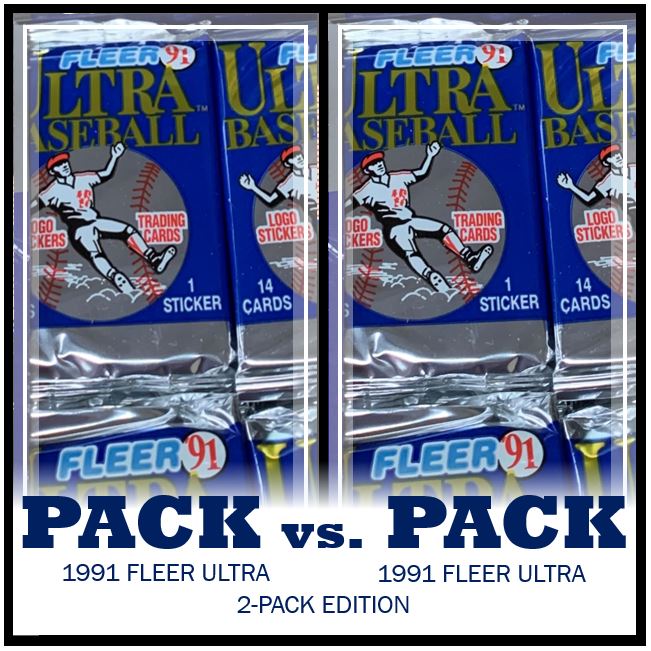
Looking back, I feel like I’ve said his on my last Pack vs. Pack posts, but I haven’t done one of these in a while. I think sometimes I just forget that I’ve done them before and then I forget to set aside a few packs to do it. Well, this time I remembered and when I opened a recent box of Ultra, I made sure to set some aside.
After doing this I realized that there is a challenge in doing it with older boxes. I built my Pack vs. Pack idea more around scoring newer releases with inserts, numbered cards, and a focus on rookies. But older, junk wax releases just don’t have the same thing. Not only did they not have as many “inserts”, but you only got a couple in the box.
It was tough but the scoring is dominated by Hall of Famers, Stars and my favorite team and how I score them. I decided to pit two packs of 1991 Fleer Ultra against another two packs of 1991 Fleer Ultra. I’m not sure if this type of cannibalism is good or bad for the game, but we’ll give it a shot.
Here’s a reminder of how I go about scoring them for this game.
The First Packs

The first pack was tied for the best pack of all. It was 19 points by itself and had two of the Hall of Famers in Larkin and Dawson. It also had a good chunk of All-Star level talent in Ozzie Guillen, Jeff Reardon and Juan Samuel. Then it added some Star level talent in Gregg Olson, Steve Avery and Mike Henneman.
Unfortunately though there was nothing special by way of rookies, inserts or any cards of my favorite team.

The second pack was another good one and just behind the first with 16 points. Another Hall of Famer appeared in Robin Yount. But it was more All-Star level talent in Canseco, Mattingly, and David Cone that really helped this one. The Star level had Walt Weiss, Kelly Gruber and Ellis Burks.
Cone fortunately doubled as a card from someone on my favorite team and eked out another point. This pack also had Reggie Jefferson to cover a rookie in the pack. I think this might have actually been a prospect card and maybe not a rookie card, but I as long as I was giving points the same too all the packs I didn’t much care about the difference.
Those were two pretty strong packs to put together.
The Second Packs

The third pack was a bit of a dud and only mustered 7 points. The reason was almost entirely because of a lack of Hall of Famers. There were only two players I consider All-Stars in John Franco and Kenny Rogers, with Franco also scoring as a Met. Then it also had Rick Honeycutt who I labeled as a Star-level player.

The last pack was another nice pack and tied with the first pack with 19 points total. There were two Hall of Famers in Ryne Sandberg and Kirby Puckett. The Puckett was also the lone “insert” I had for these packs and pulled in an extra point for that. The All-Stars were Paul O’Neill and Darren Daulton and the Stars were Jeff Montgomery and Jeff Blauser. Throw in Gregg Jefferies and what it didn’t have at the very top it made for in volume of lower scoring cards.
The Final Tally
Drum roll please…
First Packs (35 pts)
- Favorite Team: 1 (1 pt)
- Stars: 6 (6 pts)
- All-Stars: 6 (12 pts)
- Hall of Famers: 3 (15 pts)
- Rookies: 1 (1 pts)
Second Packs (26 pts):
- Inserts: 1 (1 pts)
- Favorite Team: 2 (2 pts)
- Stars: 3 (3 pts)
- All-Stars: 4 (8 pts)
- Hall of Famers: 2 (10 pts)
- Rookies: 2 (2 pts)
That third pack really doomed the second set up packs when it was 2 to 3 times less than the other packs in this whole game. I definitely feel like if I am pitting the same types of packs against each other I need to do multiples when it comes to older sets of cards. Otherwise the scoring would be really low and probably mean a better chance of a dud. I think the difference would be if I had two different sets together.
I have a few more Pack vs. Pack posts planned for some other box openings I did so hopefully they will produce some excitement, such as it is.
To find out more about 1991 Fleer Ultra, check out Baseballcardpedia.com.